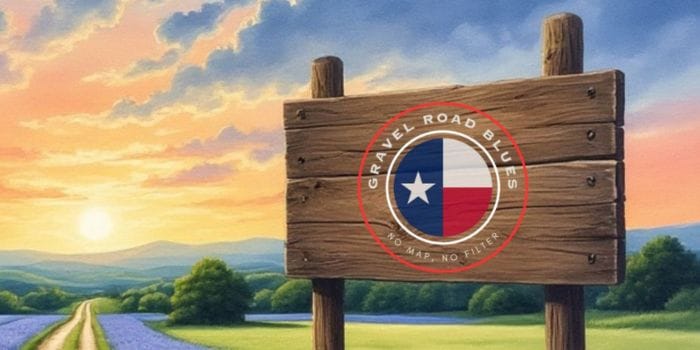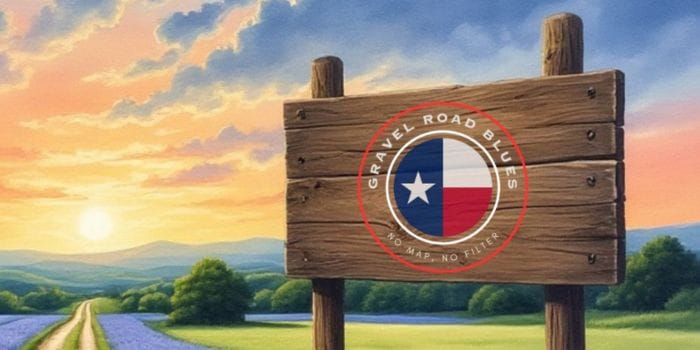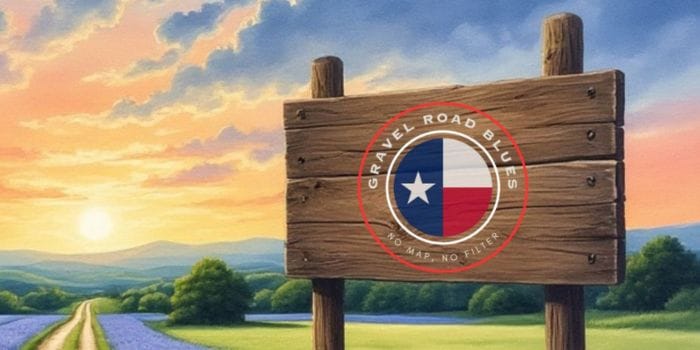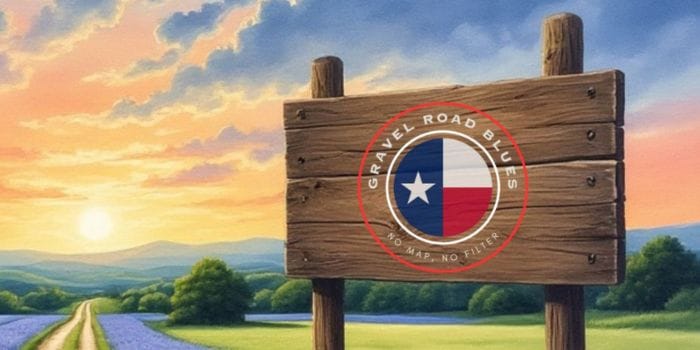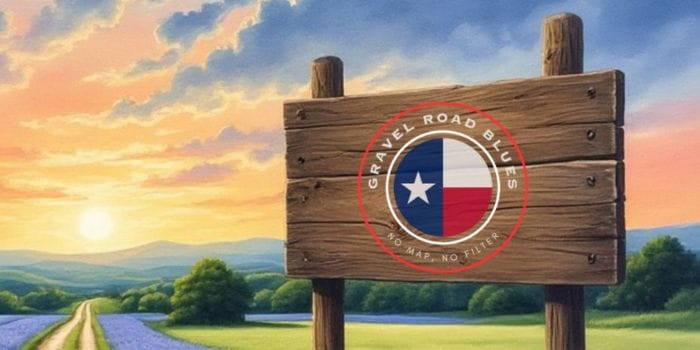Open Letter to Lt. Governor Dan Patrick on Senate Bill 3
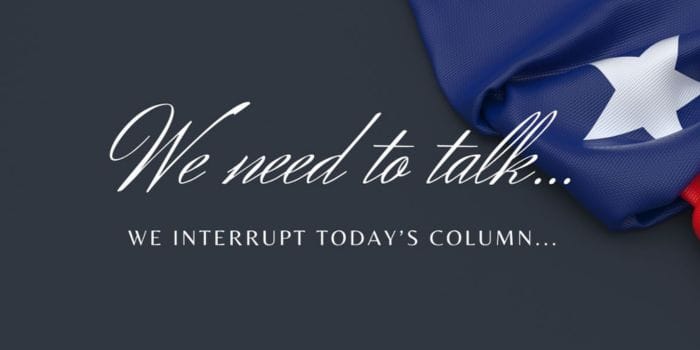
The Honorable Dan Patrick
Lieutenant Governor of Texas
Lieutenant Governor Patrick,
It has come to my attention that you have prompted an initiative that puts my well-being and the well-being of other Texans I know in great jeopardy. I would prefer to think that this was not your initial intention or design; thus, it behooves me to bring you to our vantage point for a moment and allow you to see the view from our side of the fence.
Allow me to introduce myself, and why I can even speak to this.
As any self-respecting Bucee's will tell you, "I wasn't born in Texas, but I got here as fast as I could."
My father worked in Dallas and Houston. I was born in Atlanta. He did a lot of driving and flying for many years and impressed on me (unwillingly) the following three points:
- Georgia is fantastic, but Texas is the Promised Land.
- The Texas Rangers are the best law enforcement in the country. Possibly the world.
- Texans have big hearts because their hearts are as big as Texas.
Being young, I didn't believe any of these for a second.
Right before he passed, he instructed me to take everything I owned and move to Texas. He said, "It's the only place you can go to live right, build your good name, and be let alone. It'll suit you." By then, we had 40 years for me to understand my father knew what he was talking about.
In true Davy Crockett fashion, I found myself uttering, "You may all go to Hell, and I shall go to Texas."
And here I am. A decade later.
No one comes to Texas and brings their old world with them. You either become a Texan, or you leave. There is no middle ground.
I became a Texan. So, with that mentality, I found confusion in a statement from your office.
I understand from your statement that you have said the following:
"Thousands of Stores Have Opened to Sell All Types of Dangerous Products with Unlimited THC. These Stores Even Target Your Children."
This is an incredibly general blanket statement that seems to be of a different quality than I would expect from a public servant such as yourself. I can only assume it was written in your name, so please allow this to be examined for a moment.
The claim that thousands of stores sell "dangerous products with unlimited THC" and target children in Texas is sensationalized and largely unsupported by evidence. I know this because I immediately stopped reading and researched it myself. While concerns about THC products and their accessibility are valid, this statement conflates various issues, uses alarmist rhetoric, and misrepresents the reality of THC regulation and its impact in Texas. A closer look reveals that existing regulations, consumer behavior, and law enforcement efforts are designed to prevent such outcomes.
As I understand it, Texas has strict laws regarding THC, primarily through the
Texas Compassionate Use Program
(TCUP), which only allows low-THC cannabis for medical purposes. Products containing more than 0.3% THC are classified as illegal under Texas law unless federally approved. This makes the idea of "unlimited THC" in stores factually incorrect.
Additionally:
- THC levels in products sold legally in Texas (such as Delta-8 and Delta-9 THC derived from hemp) must comply with federal regulations under the 2018 Farm Bill , which mandates THC content not exceed 0.3% by dry weight.
- Any violations are subject to enforcement by the Texas Department of Public Safety and other agencies, reducing the likelihood of widespread illegal THC distribution through storefronts.
The claim that "thousands" of stores are selling dangerous products is exaggerated. While CBD shops and stores selling hemp-derived THC products have increased, their operations are legal under current state and federal laws. These establishments must adhere to strict guidelines, including:
- Proper labeling and testing for product safety and THC levels.
- Restrictions on marketing products in ways that appeal to minors.
Furthermore, the expansion of these stores is tied to the growing demand for wellness products rather than an agenda to endanger public safety or target children.
The notion that these stores "target children" is misleading and alarmist. Most THC-related products are sold with child-proof packaging and clear labeling. Marketing practices that appeal to minors are restricted. For example:
- Gummies, candies, or beverages containing THC must comply with packaging regulations that avoid bright colors, cartoon characters, or branding designed to appeal to children.
- The FDA and Texas law closely scrutinize advertising claims, and stores violating these standards face penalties.
In instances where THC products have harmed children, it is often due to improper storage or illegal operations rather than deliberate targeting by licensed businesses. In attempting to push this bill, you punish licensed, law-abiding businesses and open the floor for even more illegal activity that cannot possibly be regulated for safety or keep these items out of the hands of children. Any sane person I can think of would prefer the sterility and safety of these products, likely from the Texas Department of Agriculture, a board on which my own Senator currently sits.
The real issue lies in public education and proper regulation, as I suggested, not in the existence of stores selling hemp-derived products. Addressing these challenges includes:
- Educating consumers on the safe use and storage of THC products.
- Enforcing stricter penalties for illegal sales to minors or false advertising.
- Supporting parental awareness of the risks of unsupervised access to any controlled substance.
Contrasting the alarm over THC products with the well-documented fentanyl crisis reveals misplaced priorities. Over the last five years, fentanyl-related deaths in Texas have increased dramatically, from 317 in 2019 to over 2,160 in 2022, reflecting a genuine public health emergency. In comparison, there is no evidence suggesting comparable harm directly caused by regulated THC products.
Rather than being sources of societal harm, these stores contribute positively by:
- Providing access to products that help manage chronic pain, anxiety, and other conditions under legal medical frameworks.
- Creating economic opportunities through job creation and tax revenue.
- Offering a regulated alternative to the illicit market, which is more likely to sell unsafe products.
The claim that "thousands of stores sell all types of dangerous products with unlimited THC" targeting children is a distortion of reality. While the responsible use and regulation of THC products warrant attention, the alarmist framing detracts from addressing genuine public health issues, such as the fentanyl crisis. Texas policymakers and communities should focus on balanced regulation, consumer education, and enforcement to ensure public safety without resorting to fear-mongering.
Now that we've addressed what is purported to be your claim, let's examine one segment this will heavily impact, proud Texan military veterans such as myself.
Outlawing THC products disproportionately affects combat veterans and others suffering from chronic illnesses or mental health conditions. For many, THC provides a legal and regulated option for symptom management and overall quality of life. Outlawing these products without offering viable alternatives not only undermines their well-being but also exposes them to serious risks, including homelessness, substance abuse, and suicide.
Many combat veterans have fibromyalgia, a chronic pain condition linked to their service. I am one of those combat veterans. THC products, particularly those derived from hemp, have been reported to provide significant relief from muscle pain and insomnia, common symptoms of this condition. Without access to these products, veterans might be forced to rely on opioids, which carry a high risk of addiction and adverse side effects.
Veterans of the Gulf War (1990-1991) frequently experience Desert Storm Syndrome, which includes symptoms such as fatigue, memory loss, and joint pain. Again, I am in this subset and a member of the DSS Registry, having served with the 82d Airborne Division during this conflict, where I was personally exposed to both
and the infamous burn pits. Those adventures have led to five cardiac arrests and a stroke before the age of 45 in my unique case. Thankfully none since I have been home in Texas. THC and CBD have been researched for their neuroprotective and anti-inflammatory properties, potentially offering relief for these debilitating symptoms. This is likely why I have enjoyed that pause in emergency room visits.
Post-Traumatic Stress Disorder (PTSD) affects a significant portion of veterans. THC has shown promise in alleviating anxiety, flashbacks, and insomnia linked to PTSD. Research published in Frontiers in Psychology found that cannabinoids could reduce the intensity of nightmares and improve sleep quality for individuals with PTSD, offering them a path to more normal social and occupational functioning.
When THC products are outlawed, individuals relying on them face dire consequences, and these will thus become part of your legacy.
Veterans already represent a disproportionate percentage of the homeless population in Texas. Denying access to products that enable them to manage chronic conditions can lead to job loss or social isolation, increasing the likelihood of homelessness.
Many individuals turn to THC as an alternative to alcohol or illicit substances to manage pain or mental health symptoms. When these products are inaccessible, some may resort to more harmful substances, exacerbating the cycle of addiction and instability. I have been fortunate enough to avoid this, but others do not have this luck going for them.
They are honorable men and women who, as proud Texans, do not deserve this malfeasance imposed upon them in addition to the pain they already battle with.
Suicide rates among veterans are tragically high. Pain, PTSD, and untreated mental health conditions are leading contributors. THC provides a means of relief for many, and eliminating this option could strip veterans of a critical tool in their fight to maintain mental and emotional health. A report by the National Veterans Foundation underscores how untreated PTSD is a significant risk factor for veteran suicides.
Outlawing THC products without considering their role in managing the health and well-being of combat veterans and others with chronic conditions is not only short-sighted but potentially devastating. These individuals rely on safe, regulated access to THC products to function in society, maintain employment, and live with dignity. Denying them this access threatens their stability and forces them into precarious situations where their livelihoods, sobriety, and even lives are at risk.
Instead of blanket bans, Texas lawmakers should focus on balanced regulation and ensuring these products are accessible to those who genuinely need them. This approach safeguards public health and honors the sacrifices of those who have served our country.
I'm confident that it would be your preference to honor our veterans and seek the positive well-being of all Texans.
For me personally, I was introduced to CBD to deal with the excruciating pain I mentioned prior at a small legal shop in Weatherford. You and Governor Abbott had promised jobs; you delivered, and I was working them.
Fibromyalgia pain can be pain on a brand new level, and it's hard to see the light when you are fighting tears for 12 hours next to railroad tracks as it feels like body parts are being taken off.
With that pain, being trapped in a small 7-Eleven restroom with a live rattlesnake would be more fun.
I have veteran friends who are more inclined to the THC side of things. They have their reasons, and I respect that. It is a choice I thankfully get to make, and I prefer to be stone cold sober without pain, or at least pain at a bare minimum.
Furthermore, Willie Nelson is a Texan. He's practically a patron saint of Texas. If you fail to see the irony in that fact and the legislative discussion we are having, then I have even more questions.
I am now a Texan. There is no inkling of a doubt. I have no plans to willingly leave this state ever again in my lifetime. I believe in the good of the Lone Star State and the good people that reside here. And for those that want to misbehave and cause havoc, we have an answer for that.
I plan on living the rest of my days here in as much peace as possible and dying here (but not in the near future).
If the Veterans Administration doesn't sort out a place to plant me when my time is up, then I'll get scattered here somewhere.
Because in the last decade, I've learned three things that I'm pretty certain on:
- Georgia was fantastic, but Texas is the Promised Land.
- The Texas Rangers are the best law enforcement in the country. Possibly the world.
- Texans have big hearts because their hearts are as big as Texas.
It is as a proud Texan, a Texas First Texan, if you could call it that, I am hopeful you will review this recent statement and reconsider for a better solution.
God Bless Texas.

